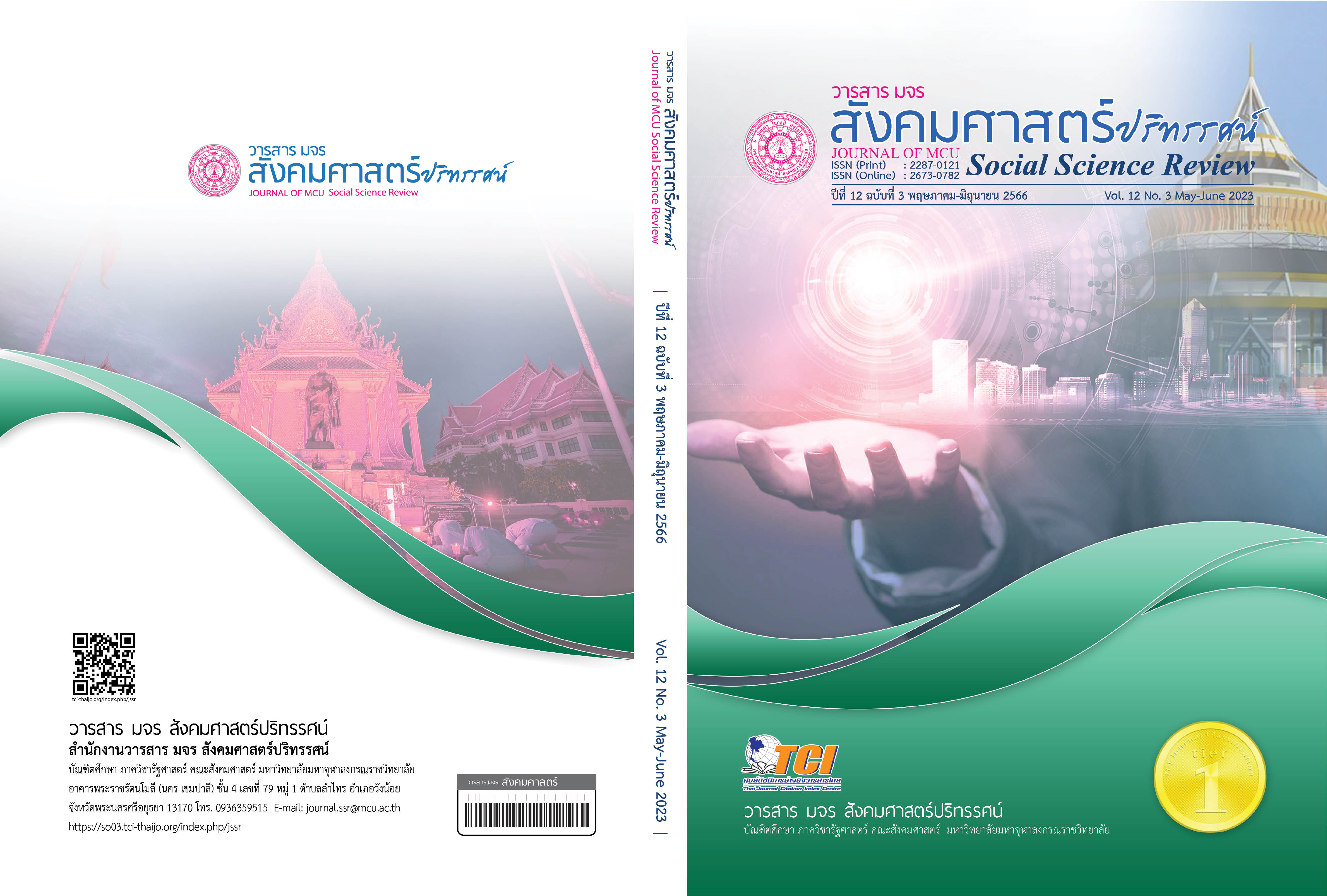ปัจจัยที่มีอิทธิพลต่อความผูกพันต่อองค์การของพนักงานในองค์กรปกครองส่วนท้องถิ่นจังหวัดมหาสารคาม
คำสำคัญ:
คุณลักษณะงาน, แรงจูงใจในการปฏิบัติงาน, หลักสังคหวัตถุ 4, หลักอิทธิบาท 4, ความผูกพันต่อองค์การบทคัดย่อ
การวิจัยครั้งนี้มีวัตถุประสงค์ คือ 1. เพื่อศึกษาความผูกพันต่อองค์การของพนักงาน 2. เพื่อศึกษาปัจจัยที่มีอิทธิพลต่อความผูกพันต่อองค์การของพนักงาน 3. เพื่อเสนอแนวทางการพัฒนาความผูกพันต่อองค์การของพนักงาน การวิจัยเป็นแบบผสานวิธี ระหว่างการวิจัยเชิงปริมาณและการวิจัยเชิงคุณภาพ สำหรับการวิจัยเชิงปริมาณเป็นการวิจัยแบบสำรวจโดยใช้แบบสอบถามในการเก็บรวบรวมข้อมูลจากกลุ่มตัวอย่างพนักงานจำนวน 348 คน ซึ่งคำนวณโดยใช้สูตรของ ทาโร ยามาเน่ จากประชากรพนักงาน จำนวน 2,670 คน สถิติที่ใช้ในการวิเคราะห์ข้อมูล ได้แก่ ความถี่ ร้อยละ ค่าเฉลี่ย ส่วนเบี่ยงเบนมาตรฐาน การถดถอยเชิงเส้นอย่างง่ายและการถดถอยแบบขั้นตอน ส่วนการวิจัยเชิงคุณภาพ ใช้การสัมภาษณ์เชิงลึกผู้ให้ข้อมูลสำคัญ จำนวน 20 คน โดยการเลือกแบบเจาะจง และทำการวิเคราะห์ข้อมูลโดยใช้การวิเคราะห์เนื้อหาเชิงพรรณนา
ผลการวิจัยพบว่า 1. พนักงานที่เป็นกลุ่มตัวอย่างมีความคิดเห็นเกี่ยวกับความผูกพันต่อองค์กรโดยรวมเฉลี่ยอยู่ในระดับมาก และเมื่อพิจารณรายด้าน ปรากฏว่า พนักงานที่เป็นกลุ่มตัวอย่างมีความคิดเห็นเกี่ยวกับความผูกพันต่อองค์กรรายด้านทุกด้าน โดยเฉลี่ยอยู่ในระดับมาก เช่นเดียวกัน 2. จากการวิเคราะห์การถดถอยเชิงเส้นอย่างง่าย ปรากฏว่า แต่ละปัจจัย คือคุณลักษณะงาน แรงจูงใจในการปฏิบัติงาน หลักสังคหวัตถุ 4 และหลักอิทธิบาท 4 ต่างก็มีอิทธิพลต่อความผูกพันต่อองค์การของพนักงาน และจากการวิเคราะห์การถดถอยแบบขั้นตอน ปรากฏว่า หลักอิทธิบาท 4 หลักสังคหวัตถุ 4 และแรงจูงใจในการปฏิบัติงาน มีอิทธิพลร่วมกันต่อความผูกพันต่อองค์การของพนักงาน 3. ข้อเสนอสำหรับการพัฒนาความผูกพันต่อองค์การของพนักงานคือ พนักงานควรประยุกต์ใช้หลักอิทธิบาท 4 และหลักสังคหวัตถุ 4 ในการปฏิบัติงาน และผู้บริหารควรส่งเสริมแรงจูงใจในการปฏิบัติงานของพนักงานและสนับสนุนคุณลักษณะงานของพนักงาน
เอกสารอ้างอิง
Ketkomol, et al. (2020). A Study of the Result of the Commitment to the Organization according to Sangaha vatthu 4 Office of the Welfare Promotion Commission for Teacher and Educational Personnel. Journal of Graduate Study Review Nakhonsawan Buddhist College, 8(2), 95-120.
Chuchai Smithikrai. (2013. Recruitment, Selection and Evaluation Personnel Performance (4th ed). Bangkok: Chula Press.
Kovit Puangam. (2016). Thai Local Governance (9th ed.). Bangkok: Winyuchon Publication House.
Kritpak Panthanom. (2014). Influence of Job Characteristics, Social Support, and Organizational Socialization on Organizational Commitment of Employees in a Private Company, Nonthaburi Province. Journal of Social Sciences and Humanities, 40(1), 194-207.
Natchawan Kosaiyakanont & Srirath Gohwong. (2020). Organizational Commitment of the Employees in the Department of Science Service. Research and Development Journal Loey Rajabhat University, 15(53), 32-40.
Nittaya Jitrumpun (2016). Idddhipada Principles for Success and Happiness in Work Performance of Personnel Primary Care Unit of Mueang District, Surat Thani Province. Region 11 Medical Journal, 30(3), 169-177.
Office of Maha Sarakham Province. (2021). The Development Plan of Maha Sarakham Province B.E. 2561-2565.
Parichat Ritsongmuang, “The Relationship between Work Motivation and Organizational Commitment of Government Officials in the Department of Agricultural Extension, Ministry of Agriculture and Cooperatives,” Journal of College of Innovative Management, Valaya Alongkorn Rajabhat University, Vol. 3 No. 1 October 2014 – January 2015, pp. 79-86.
Rungroj Attanit. (2011). Employee Engagement Bangkok: Hr. Center Co., Ltd.
Steers & Porter, L. W. (1979). Motivation and Work Behavior (2nd ed.). New York: McGraw-Hill.
Sunisa Nopparat. (2015). The Relationship between Work Motivation and Organizational Commitment of Polices at Wang Noi Police Station, Pra Nokhon Sri Ayuthya. Journal of College of Innovative Management Valaya Alongkorn Rajabhat University, 3(1), 167-173.
Surin Niyamangkoon et al. (2021). Effect of Working Motivation, Self Esteem, and Iddhipata Principle on Joy at Work of Supporting Personnel of MCU. Journal of MCU Social Review, 10(2), 114-125.
Universe Suksamaitri. (2016). Organizational Culture Based on Sangkaha vattu 4. Journal of MCU Social Sciences Review, 5(2), 139-152.
Wright, P., et al. Human Resources and the Resource-based View of the Firm. Journal of Management, 6(1), 701–721.
ดาวน์โหลด
เผยแพร่แล้ว
รูปแบบการอ้างอิง
ฉบับ
ประเภทบทความ
สัญญาอนุญาต
ลิขสิทธิ์ (c) 2023 วารสาร มจร สังคมศาสตร์ปริทรรศน์

อนุญาตภายใต้เงื่อนไข Creative Commons Attribution-NonCommercial-NoDerivatives 4.0 International License.
เพื่อให้เป็นไปตามกฎหมายลิขสิทธิ์ ผู้นิพนธ์ทุกท่านต้องลงลายมือชื่อในแบบฟอร์มใบมอบลิขสิทธิ์บทความให้แก่วารสารฯ พร้อมกับบทความต้นฉบับที่ได้แก้ไขครั้งสุดท้าย นอกจากนี้ ผู้นิพนธ์ทุกท่านต้องยืนยันว่าบทความต้นฉบับที่ส่งมาตีพิมพ์นั้น ได้ส่งมาตีพิมพ์เฉพาะในวารสาร มจร สังคมศาสตร์ปริทรรศน์ เพียงแห่งเดียวเท่านั้น หากมีการใช้ภาพหรือตารางหรือเนื้อหาอื่นๆ ของผู้นิพนธ์อื่นที่ปรากฏในสิ่งตีพิมพ์อื่นมาแล้ว ผู้นิพนธ์ต้องขออนุญาตเจ้าของลิขสิทธิ์ก่อน พร้อมทั้งแสดงหนังสือที่ได้รับการยินยอมต่อบรรณาธิการ ก่อนที่บทความจะได้รับการตีพิมพ์ หากไม่เป็นไปตามข้อกำหนดเบื้องต้น ทางวารสารจะถอดบทความของท่านออกโดยไม่มีข้อยกเว้นใดๆ ทั้งสิ้น





